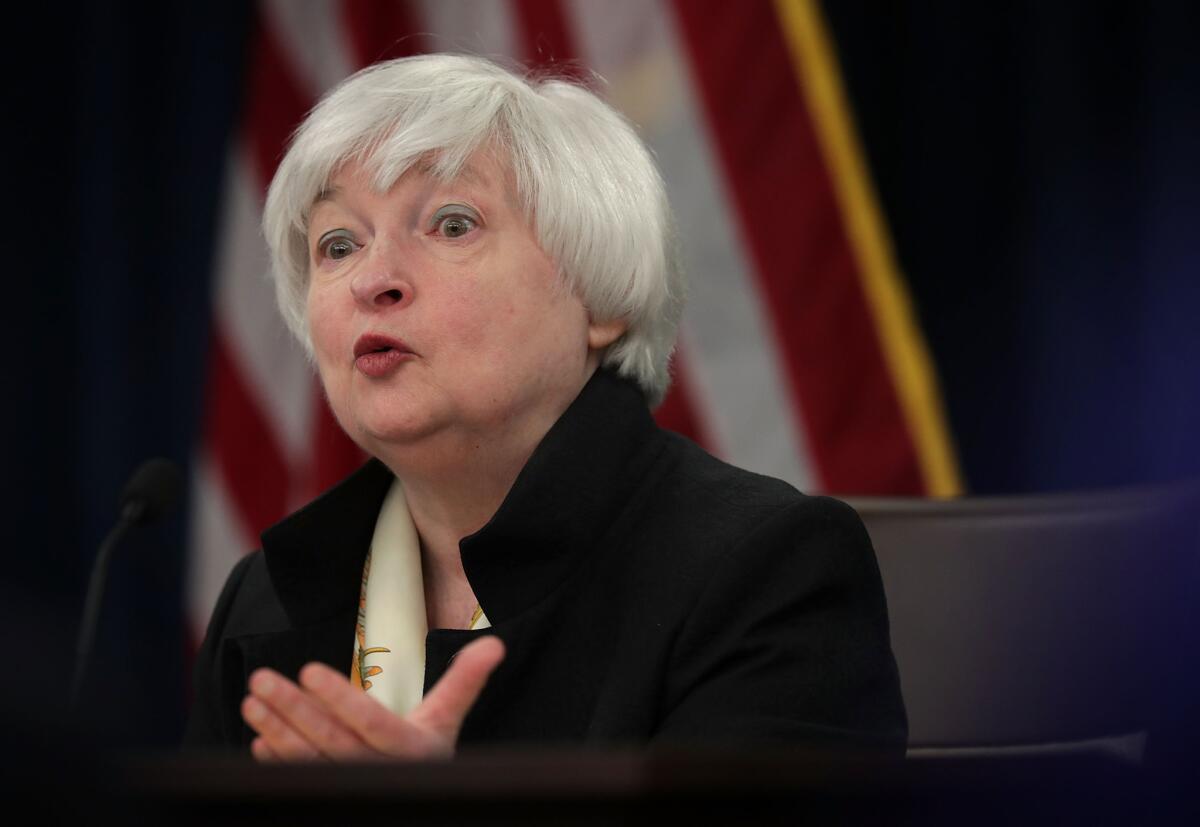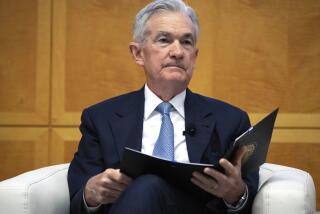Potential for ‘Brexit’ adds to need for rate hike caution, Fed’s Janet Yellen says

Federal Reserve Chairwoman Janet L. Yellen speaks at a news conference June 15.
- Share via
Recent uneven growth by the U.S. economy together with global worries — particularly Thursday’s British vote on leaving the European Union — warrant a cautious approach to raising a key short-term interest rate, Federal Reserve Chairwoman Janet L. Yellen told lawmakers Tuesday.
She pushed back against Republicans on the Senate Banking Committee who criticized the Fed for continuing to hold the rate down seven years into the recovery from the Great Recession.
Those senators argued the extremely low rate — now about 0.37% — was holding back growth in the long run by pulling in future spending and that the Fed’s hesitancy to enact hikes was confusing investors.
But Yellen said the Fed was trying to be careful not to raise the rate prematurely.
While central bank policymakers “anticipate that economic conditions will improve further,” there is “considerable uncertainty” about the nation’s economic outlook, Yellen said in her semiannual monetary report to the committee.
Among the potential problems are the impact of the so-called Brexit vote, she said.
A vote to leave the EU would hurt the British and European economies and the effects could spill across the Atlantic, Yellen said.
“I think it would usher in a period of uncertainty, and it is very hard to predict but there could be a period of financial market volatility that would negatively affect financial conditions and the U.S. economic outlook,” she said.
“It is something we will be carefully monitoring,” Yellen said.
Concerned about a slowdown in job growth and the financial market turmoil of Brexit, Yellen and her Fed colleagues decided to hold the central bank’s benchmark interest rate steady last week.
See the most-read stories in Business this hour >>
Yellen said last week she remained optimistic about the health of the U.S. economy and indicated a small rate hike could come as early as July if job growth improves after a surprisingly anemic report this month.
That report showed the economy added just 38,000 net new jobs in May, the worst performance since 2010 and well below the approximately 200,000 monthly average for the first three months of the year.
The unemployment rate fell to 4.7%, but largely because nearly half a million Americans dropped out of the workforce.
On Tuesday, Yellen cautioned senators not to read too much into the recent jobs data.
“It is important not to overreact to one or two reports, and several other timely indicators of labor market conditions still look favorable,” she said, specifically citing “some tentative signs that wage growth may finally be picking up.”
Her comments were slightly less optimistic than last week. On Tuesday, Yellen did not signal that a rate hike could come next month. And she indicated more uncertainty about whether job growth and inflation were moving toward the Fed’s goals.
Some Democrats on the committee criticized the lack of diversity in the upper leadership ranks of the Fed and its 12 regional banks. In February, Yellen and the members of the Fed’s Board of Governors approved the reappointment of 12 regional bank presidents; 10 of them are men.
Sens. Elizabeth Warren (D-Mass.) and Robert Menendez (D-N.J.) were among more than 120 members of Congress who wrote to Yellen last month complaining about “the disproportionately white and male” leadership at the nation’s central bank.
MORE FROM BUSINESS
Twitter and Vine loosen limits to hold on to users
PG&E to close Diablo Canyon, California’s last nuclear power plant
Follow @JimPuzzanghera on Twitter
UPDATES:
1 p.m.: This article was updated throughout.
9:50 a.m.: This post was updated with additional comments from the hearing by Yellen and senators.
The first version of this article was published at 7:32 a.m.
More to Read
Inside the business of entertainment
The Wide Shot brings you news, analysis and insights on everything from streaming wars to production — and what it all means for the future.
You may occasionally receive promotional content from the Los Angeles Times.











